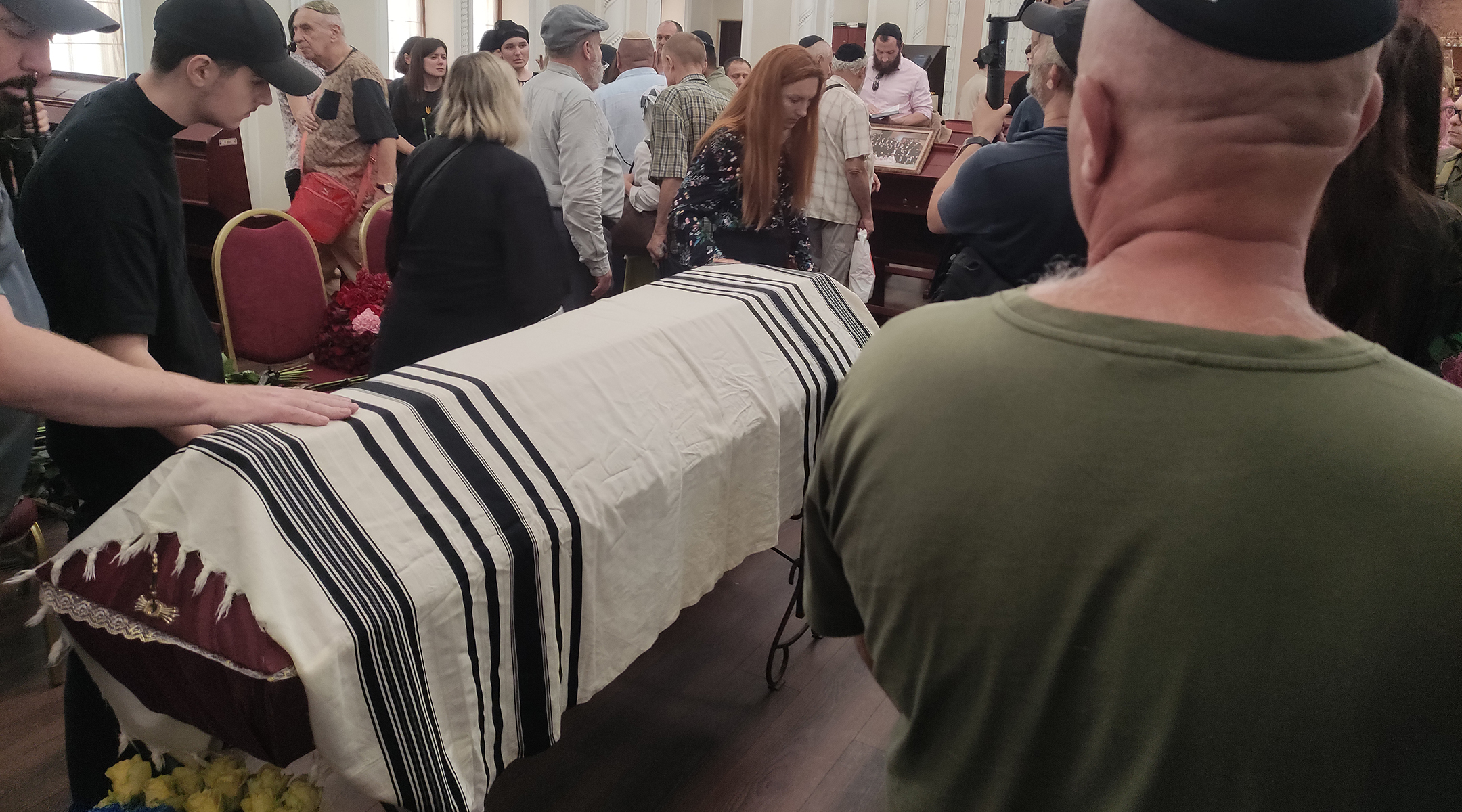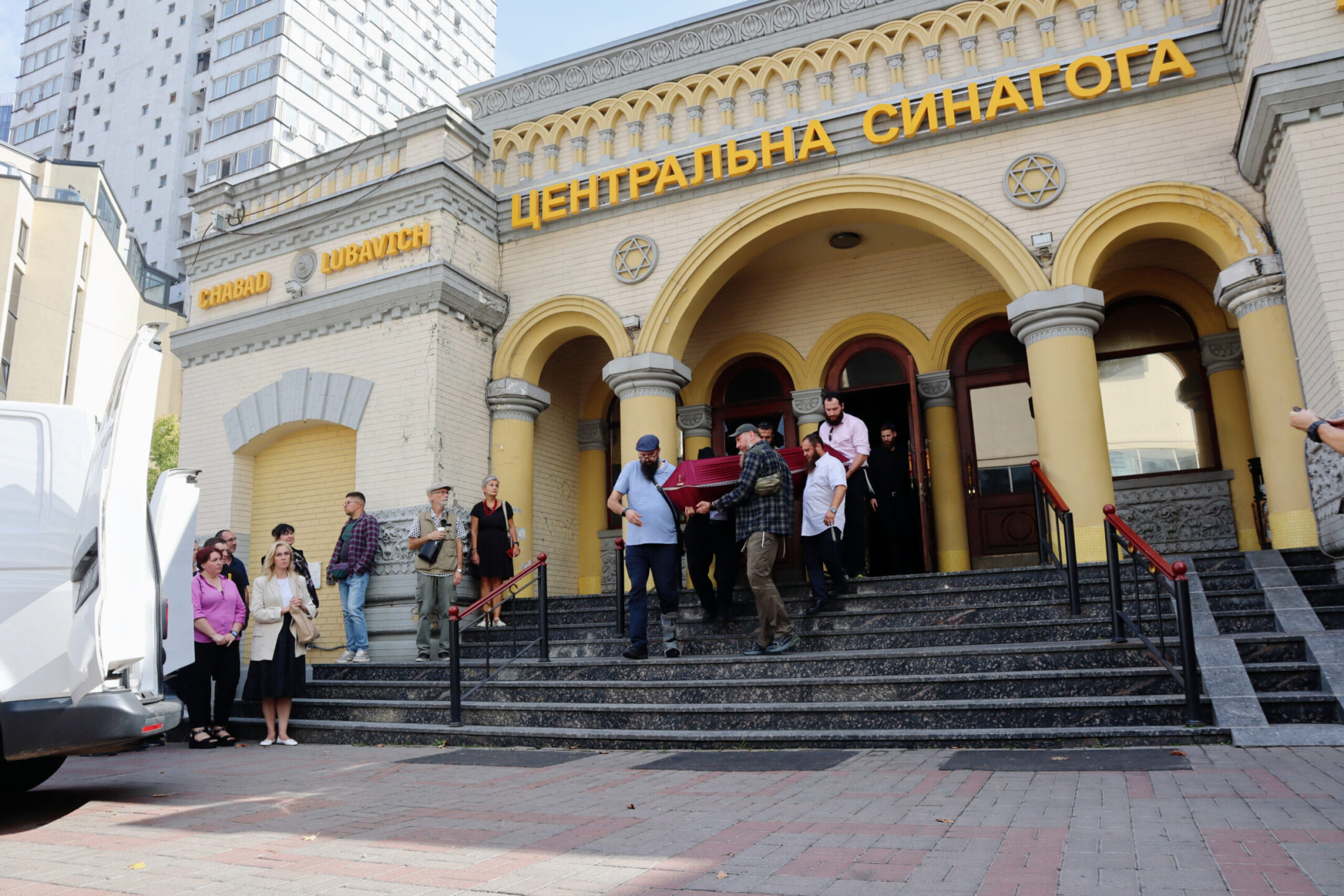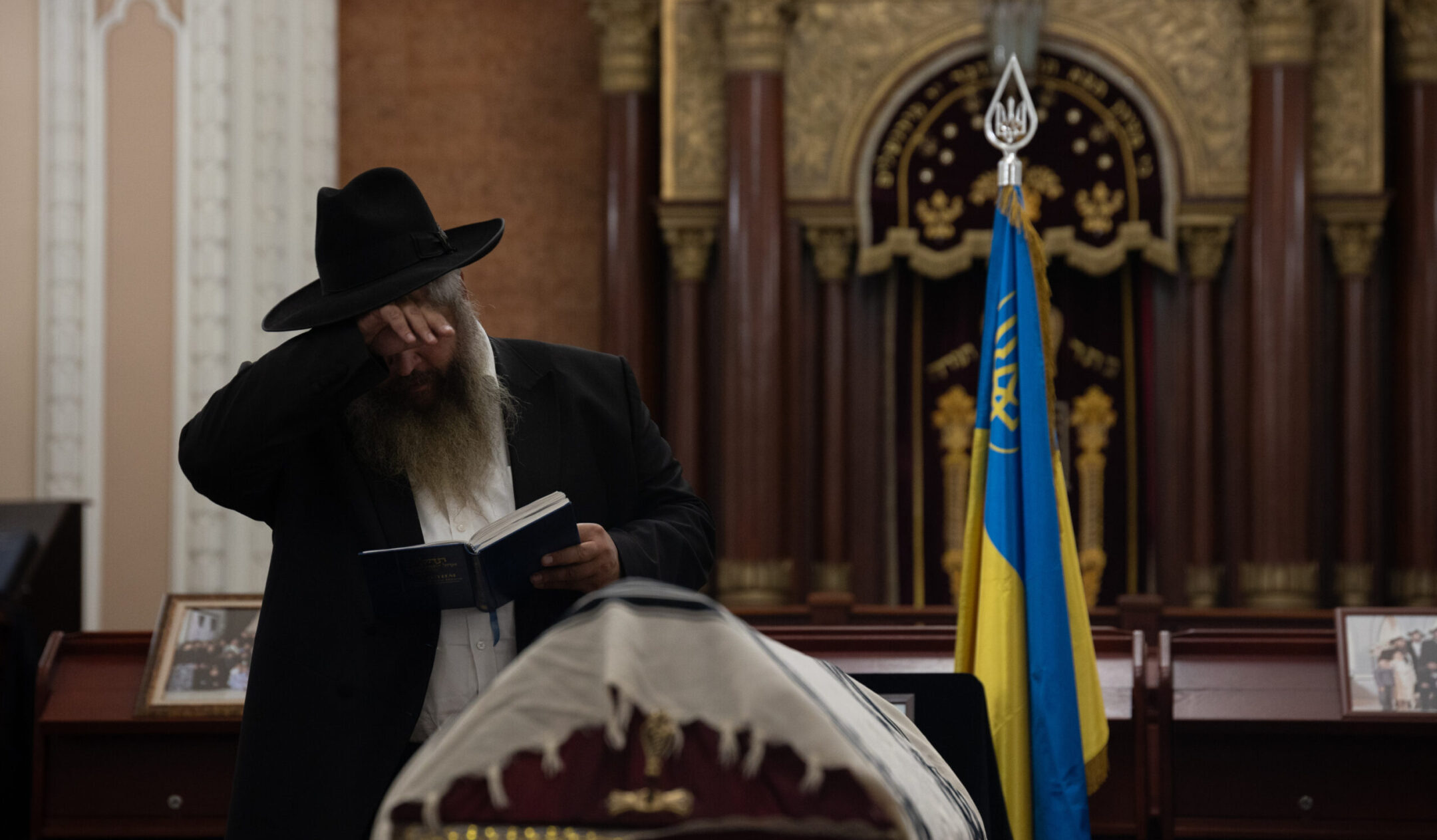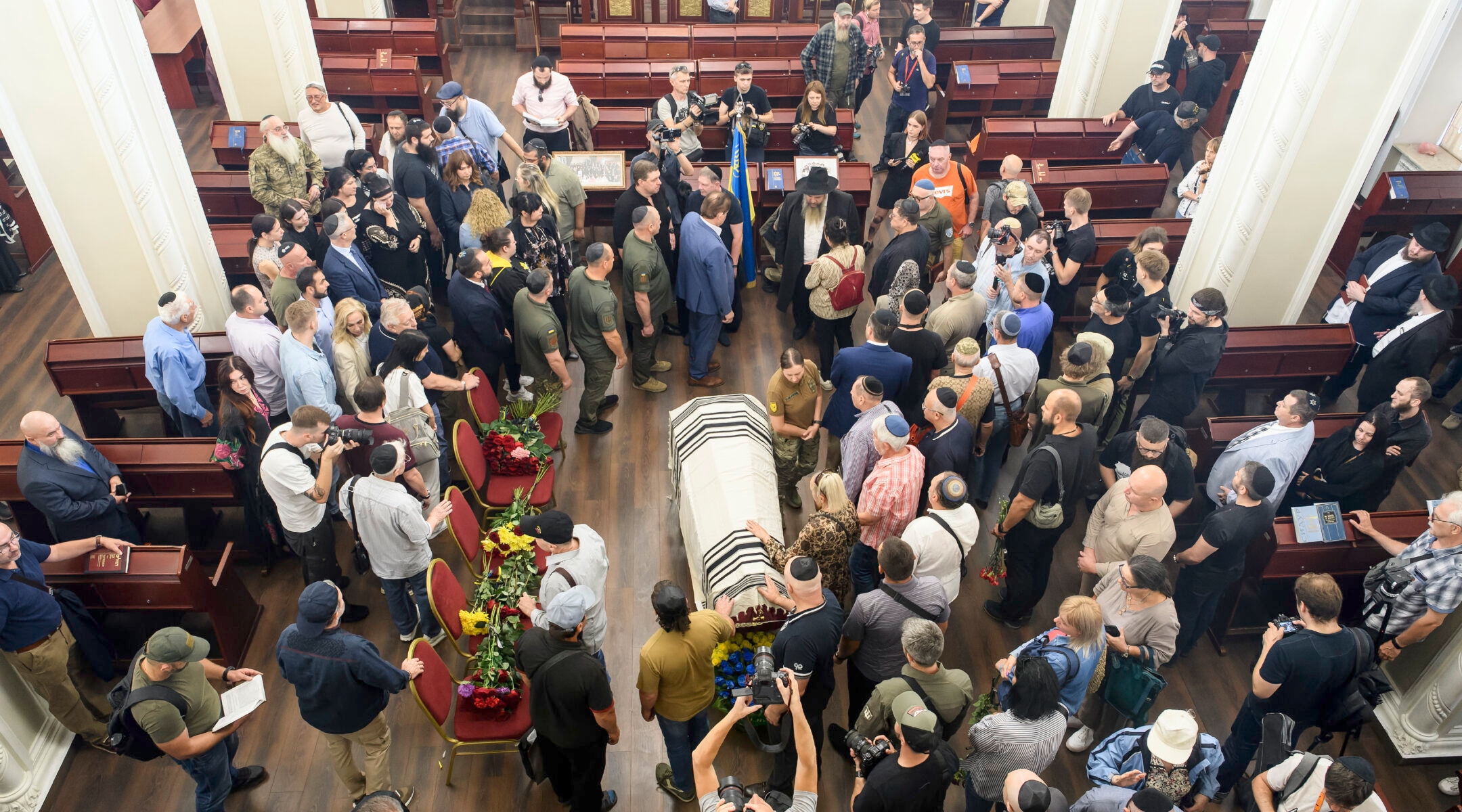KYIV, Ukraine — Dozens of Jewish soldiers and civilians, together with many non-Jewish Ukrainians, gathered Thursday at Kyiv’s Brodsky Central Synagogue to bid farewell to the son of a prominent rabbi who died on the front weeks after being drafted into the Ukrainian army.
Anton Samborskyi, 32, was the adopted son of Moshe Azman, one of two men who claim title as chief rabbi of Ukraine.
Speaking at the synagogue service — which was also attended by Israel’s ambassador to Kyiv, Michael Brodsky — Azman drew attention to the tragic irony of how Russia’s military invasion of Ukraine, which the Kremlin justifies falsely as an operation to free Ukraine from a Nazi junta, is killing many members of its national minorities, including Jews and Russians.
The Federation of Jewish Communities of Ukraine said in a statement that it has assisted in the burial of 47 Jewish soldiers fallen in combat since the start of the war. Speaking to the Jewish Telegraphic Agency, the federation’s chair, Rabbi Mayer Stambler, estimated the number of Ukrainian Jewish soldiers killed in action to be in the hundreds.
Stambler said the federation is currently providing holiday meals and other support to 1,200 Jewish soldiers on the front and across Ukraine who have requested it.
In his comments at the funeral, Azman referred to Samborskyi as Moty, the short form of Matisyahu, the Hebrew name he and his wife gave the boy when he joined the family. According to the Federation of Jewish Communities, Samborskyi had been living in a Jewish orphanage up until then. Matisyahu was a Jewish freedom-fighter during the Maccabean revolt.

Ukrainian soldiers were among those attending the funeral of Anton Samborskyi, who died while fighting against Russia. (Marcel Gascon Barbera)
“I have received tens of thousands of words of sympathy and support,” Azman said in a social media post on Friday announcing a charity campaign in Samborskyi’s honor. “I read each and every one of them. Your warm words, coming from the heart, fill me with confidence in our victory over evil.
Samborskyi was drafted as part of the country’s mandatory conscription law, which allows authorities to forcibly recruit adult males between 25 and 60.
In a statement on social media in August, Azman revealed that his adoptive son was drafted into the army a week after the birth of his daughter in May. “After completing a quick course,” the rabbi added, he was “sent right away to the front.”
Samborskyi died when a missile fell near him in the Pokrovsk axis of the Donetsk region in Eastern Ukraine, where Russia concentrates its main efforts to seize Ukrainian territory.
In interviews, Ukrainian soldiers have decried the lack of training and physical readiness of many of the new recruits sent to the front in a rush to compensate for Russia’s overwhelming advantage in personnel. They requested anonymity because they were not supposed to speak to the press
Like many of their fellow citizens of all faiths and origins, male members of the Ukrainian Jewish community told JTA that they try to avoid certain areas of their cities out of fear of bumping into the military recruitment patrols. In both Dnipro and at a Jewish camp in western Ukraine this summer, Jewish leaders said men were participating less often in communal life because of the risk of conscription.
Specialized Telegram channels run by anonymous Ukrainians inform in real time about the presence of the patrols in specific areas of the cities, in order to help those vulnerable to mobilization avoid conscription.

A coffin with the body of fallen soldier Anton Samborskyi, son of Rabbi Moshe Azman, is carried out of the Central Synagogue of Kyiv during his funeral, Sept. 12, 2024. (Andriy Zhyhaylo/Obozrevatel/Global Images Ukraine via Getty Images)
The total number of troop casualties is unknown: The Ukrainian government has not published an ongoing tally but said in February, at the war’s two-year mark, that more than 30,000 of its troops had been killed. The United States has said it believes the numbers are significantly higher. Regardless, the stalemate of battle is requiring a steady supply of new soldiers, many of whom are soon wounded or killed.
Azman released the statement about his son’s death on Aug. 29, when Ukraine commemorates the Day of Remembrance of the country’s defenders. According to the Federation of Jewish Communities, Samborskyi was officially considered missing at the time, but because of the circumstance of his disappearance the family was certain of his death.
Samborskyi’s body was only recovered and identified on Wednesday and was buried Thursday at a Jewish cemetery in Kyiv.
Born in Leningrad, now Saint Petersburg, in 1966, Azman arrived in Ukraine in the early 1990s with the mission of reviving Jewish life after decades of Soviet persecution. He started conducting religious services in one of the rooms of the Brodsky synagogue, which had not yet been returned to the Jewish community and was a puppet theater for children at the time.
He is one of the two rabbis using the unofficial title of chief rabbi of Ukraine. The other is American-born rabbi Yaakov Bleich, who came to the Eastern European country as a member of the Karlin-Stolin Hasidic movement but has since become estranged from the group’s leadership in the United States.
Chabad-Lubavitch is the largest Jewish movement in Ukraine, with rabbis in dozens of cities. A self-professed Lubavitcher who is not part of Chabad’s structure in the country, Azman gained prominence both nationally and internationally after he remained in the country at the start of Russia’s invasion.

Rabbi Moshe Azman attends the funeral of his son, Anton (Matisyahu) Samborskyi, at Kyiv’s Central Synagogue on Sept. 12, 2024. (Oleksandr Magula/Suspilne Ukraine/JSC “UA:PBC”/Global Images Ukraine via Getty Images)
Since then he has worked to rally support for Ukraine in the country and abroad. He travels regularly to the front and delivers aid to Ukrainian soldiers and civilians, Jewish and non-Jewish.
Azman’s wartime activity has made him popular among many Ukrainians, some of whom attended the funeral Thursday to demonstrate their support.
According to local reports, among those present was a representative of a foundation to support the Azov Battalion, a Ukrainian army regiment with a history of displaying Nazi symbols. The battalion has sought to rebrand amid Russian efforts to paint its enemy as heirs to the Nazis. Samborskyi was not in the brigade, the representative said.
A Jewish university professor who volunteered to join the army at the start of the war praised Azman’s support for soldiers and recalled the help he received from the rabbi after he was seriously wounded on the front.
A non-Jewish Ukrainian man who identified himself simply as Mikhail, meanwhile, said he worked as a restorer at the Brodsky synagogue when the building was still operating as a theater in the late 1970s.
“I follow him on Facebook and respect what he does,” Mikhail said about Azman. “I want to be here today to show him and his family my support in this difficult moment.”
JTA has documented Jewish history in real-time for over a century. Keep our journalism strong by joining us in supporting independent, award-winning reporting.






